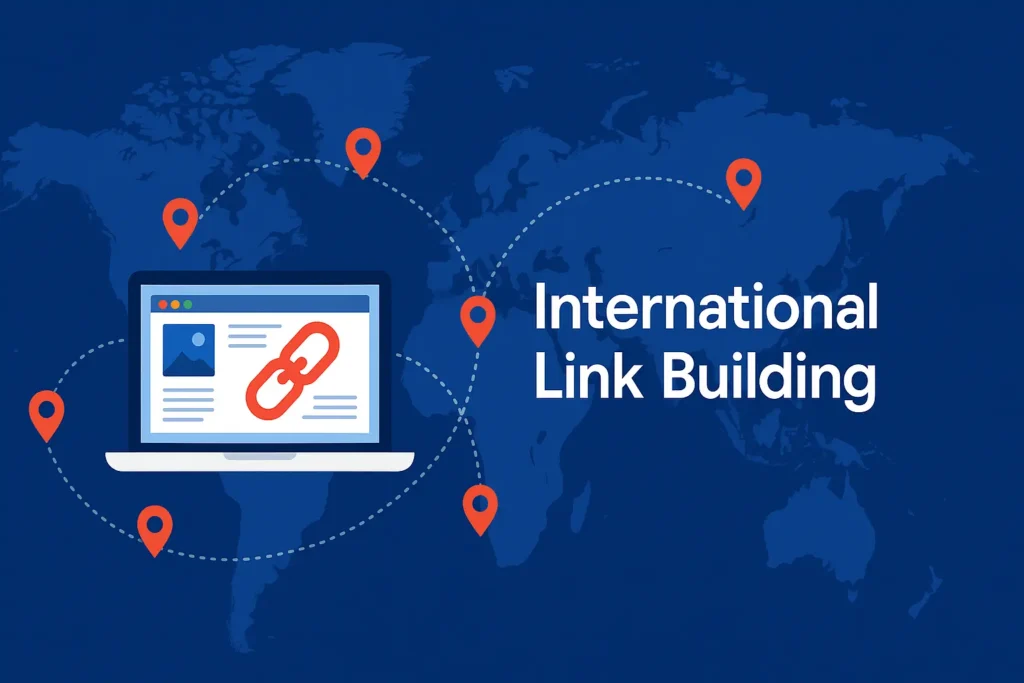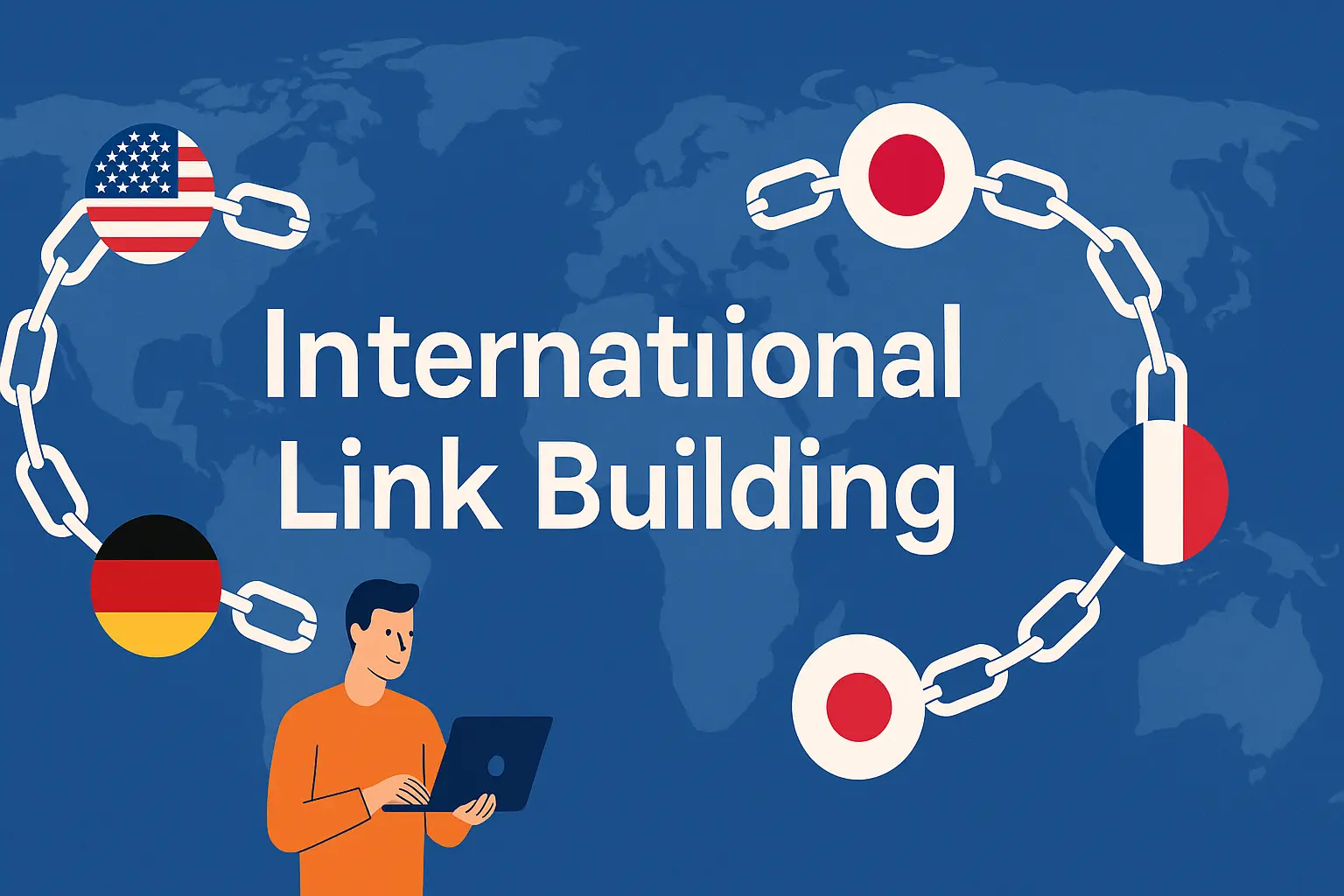In today’s hyper-connected economy, search engines no longer view your site in isolation. They interpret every backlink as a vote of confidence—especially when it comes from a local, respected source in a different region. These international signals shape how Google and other search engines rank your content globally. More importantly, they shape how people perceive your brand outside your home market.
International link building is not about chasing links—it’s about earning them through relevance, cultural alignment, and strategic outreach. In this article, we’ll dive deep into proven techniques about International Link Building that help brands grow global authority and trust—one link at a time.
What is International Link Building?

International link building is the practice of acquiring backlinks from websites based in different countries, languages, or regions to improve your website’s visibility in global search engines. Unlike traditional link building, which focuses on getting links from any high-authority source, international link building is more strategic—it considers geographical relevance, cultural context, and search engine preferences in each target market.
The core idea is to build a strong network of links from trustworthy sources in your desired international markets. For example, if your business is expanding into Germany, getting backlinks from reputable German-language websites (especially with .de domains) tells search engines like Google that your content is relevant and trusted within that region.
Importance and Benefits of International Link Building
Improves Country-Specific Search Visibility
International backlinks help your website rank higher in the search results of specific countries. Google considers local backlinks as trust signals. For example, a link from a .fr domain helps boost rankings in France. Moz (2025) found that websites with geo-specific backlinks are 54% more likely to appear in local search results, giving your brand better visibility in key international markets.
Increases Brand Credibility Among Local Audiences
Backlinks from trusted local websites boost your brand’s image among international users. People are more likely to engage with content recommended by familiar sources. Nielsen (2023) reported that global consumers trust regional media 2.5 times more than foreign outlets. When your site is mentioned by respected blogs or news platforms in other countries, it shows you’re not just present—you’re trusted.
Strengthens Localized Keyword Performance
When you get backlinks from websites using native languages, search engines better understand your relevance to that region. A 2024 SEMrush report revealed multilingual backlinks improve keyword rankings by 28% within two months. So, if you’re targeting German users, earning links from German-language content helps your localized keywords perform better—ultimately attracting more organic traffic from that specific country.
Enhances Multilingual Content ROI
Creating localized content takes time and investment, and backlinks help you get more value from it. Smartling’s 2024 research shows that translated pages attract 47% more links when optimized for the local market. These links help multilingual content rank higher and reach more readers. It’s a great way to maximize the return on your translation and localization efforts.
Drives Qualified Traffic from Global Markets
International backlinks don’t just help with SEO—they also bring in high-quality visitors from targeted regions. When a local blog links to your product or content, it sends readers already interested in your niche. According to HubSpot (2024), international referral traffic has a 19% higher conversion rate than typical paid traffic, making link building a powerful tool for customer acquisition abroad.
Supports International PR and Influencer Campaigns
When launching international PR or influencer marketing, backlinks from local media or bloggers amplify your efforts. They improve your visibility in search and increase credibility at the same time. A 2025 report by Cision found that campaigns with strong backlink profiles saw 26% more audience engagement. It’s a smart way to combine branding, outreach, and SEO under one strategy.
Builds Authority in Niche Global Industries
Getting backlinks from regional industry-specific websites positions you as a serious player in your field. For example, a mention on a Japanese robotics blog or a European finance site adds credibility in that market. These niche backlinks not only boost SEO but also invite new collaboration opportunities. Establishing authority through localized industry platforms can help open doors in competitive sectors.
Improves Mobile SEO Performance Across Regions
In mobile-first countries like India and Brazil, search behavior is dominated by smartphones. Region-specific backlinks help improve mobile search rankings, especially for voice and local intent queries. Since Google indexes mobile content first, links from mobile-optimized, local sites boost your visibility. These are especially valuable in regions where mobile use accounts for more than 70% of total internet traffic.
Accelerates Market Penetration for New Entrants
For new brands expanding into international markets, link building can help you gain traction fast. By securing backlinks from local sources, you start appearing in relevant search results even before running ads. Ahrefs (2024) found that startups using international backlinks grew their organic traffic twice as fast in new countries compared to those focusing only on paid strategies.
Future-Proofs Global SEO Against Algorithm Updates
International backlinks make your SEO more resilient to sudden algorithm shifts. A diverse backlink profile spread across various regions, languages, and domains is harder to penalize. During Google’s 2024 Helpful Content Update, websites with strong international links retained 80% of their rankings, while U.S.-centric sites dropped sharply. Global links are not just growth drivers—they’re insurance against future search changes.
Mistakes to Avoid When Running an International Link Building Campaign”
Applying a One-Size-Fits-All Strategy Across All Countries
Link building is not universal. What works in the U.S. might flop in Japan due to different content norms, search behavior, or outreach expectations. According to a 2024 report by BrightEdge, 73% of international SEO campaigns underperform when they don’t localize strategies per region. Cultural relevance and tailored outreach aren’t optional—they’re essential for gaining trust and securing quality backlinks.
Failing to Properly Localize Content
Translation isn’t the same as localization. Sending a literal English-to-French translation to a French blogger rarely resonates. A 2025 CSA Research study found that 76% of global consumers prefer content in their native language, and 55% won’t engage if it’s not. To earn regional backlinks, invest in native copywriters and culturally aligned messaging that speaks directly to the local audience.
Ignoring Country-Specific Search Engines
While Google dominates globally, countries like China (Baidu), Russia (Yandex), and South Korea (Naver) use completely different ranking systems. A 2024 SEMrush insight revealed that over 30% of SEO campaigns in Asia fail due to lack of optimization for local engines. Tailoring your backlinks and strategies to each region’s dominant search engine is key to visibility and trust.
Neglecting Regional SEO Metrics
Tracking global SEO without a regional breakdown is a major misstep. Google Search Console’s “International Targeting” and tools like Ahrefs and SEMrush offer region-based performance tracking. According to Ahrefs (2025), brands that monitored regional link metrics saw 42% better performance in target markets. You can’t improve what you don’t measure—always track localized backlink impact.
Building Links from Irrelevant or Spammy Foreign Sources
Low-quality backlinks—especially from unrelated countries or link farms—can trigger penalties. Google’s SpamBrain algorithm in 2024 flagged thousands of websites with manipulative international link patterns, resulting in de-indexing and major traffic loss. Focus on getting links from reputable sites in your niche and avoid shortcuts that could hurt your domain’s reputation.
Ignoring Domain Extensions (.de, .fr, .jp)
Backlinks from local top-level domains (ccTLDs) like .de for Germany or .fr for France send strong geo signals to search engines. Moz’s 2025 study revealed that websites with ccTLD backlinks ranked 38% higher in local search results. Ignoring country-specific domains means missing out on one of the most trusted regional ranking factors.
Using Generic Outreach Emails Across Cultures
Email outreach that works in North America might come off as too direct or impersonal in Asia or Europe. Outreach is deeply cultural. In Japan, for example, overly casual emails are viewed as disrespectful. A 2023 BuzzStream survey showed that response rates increased by 33% when outreach emails were localized for tone, formality, and language nuances.
Over-Relying on Guest Posts in One Market
Putting all your effort into guest posting in one country—while ignoring others—creates backlink imbalance. Google’s 2024 link diversity update favors domains with balanced global link profiles. Over 40% of penalized international sites had unnatural concentrations of backlinks from one region, showing that diversification matters as much as link quality.
Focusing Only on High Authority, Ignoring Local Relevance
Many marketers chase high Domain Authority (DA) but forget local relevance. A link from a smaller, well-regarded blog in Spain may carry more weight in Spanish Google SERPs than a big U.S. site. Search Engine Journal (2024) emphasized that relevant regional context often outweighs sheer link power, especially in multilingual or local intent searches.
Overlooking Mobile and UX Optimization for Regional Link Pages
Backlinks lose impact if the page they point to is poorly optimized for mobile users in that region. In countries like India and Brazil, over 80% of users access websites on mobile (Statista 2024). If your linked pages don’t load fast or render well, you risk high bounce rates and lost credibility. Optimize for local devices and connection speeds.
Conclusion
International link building isn’t just about climbing search rankings—it’s about earning real recognition in the markets you want to serve. When your content gets featured on trusted sites around the world, it tells both search engines and people that your brand belongs there. It’s about building meaningful visibility, not just global noise. Done thoughtfully, it opens doors to new audiences, stronger partnerships, and long-term growth in every region you reach.
































































